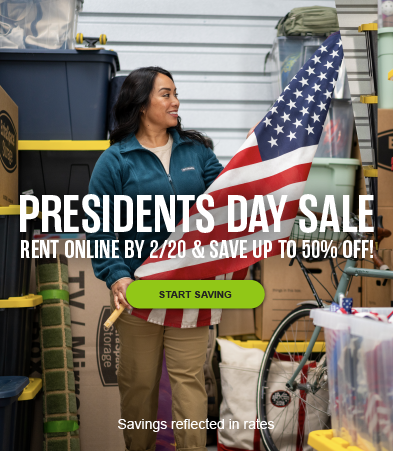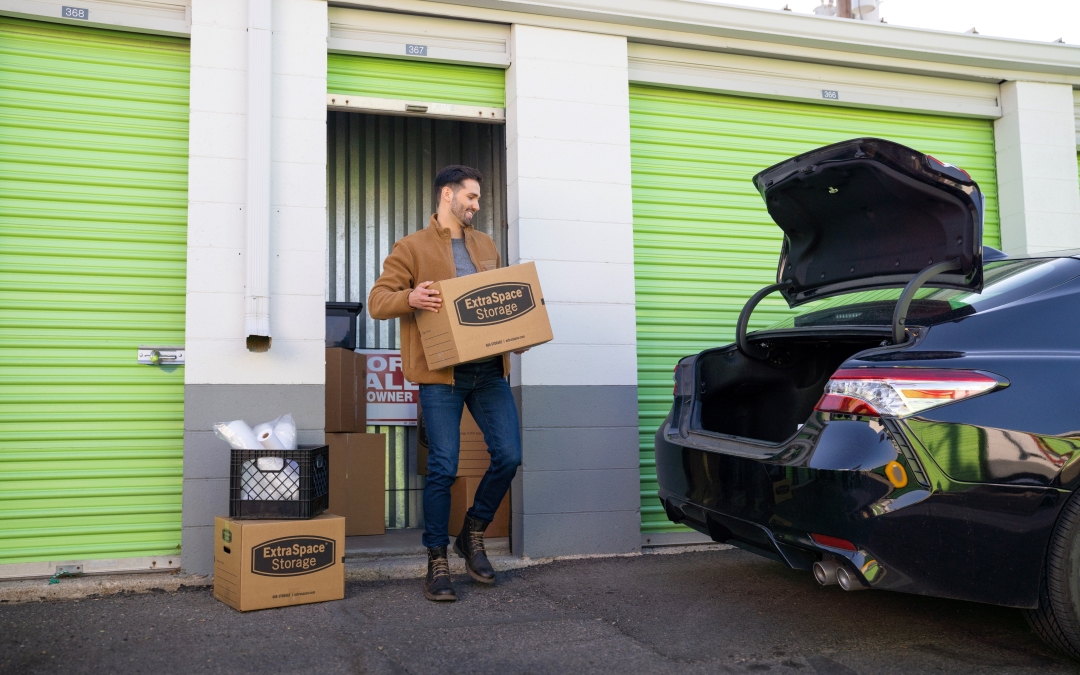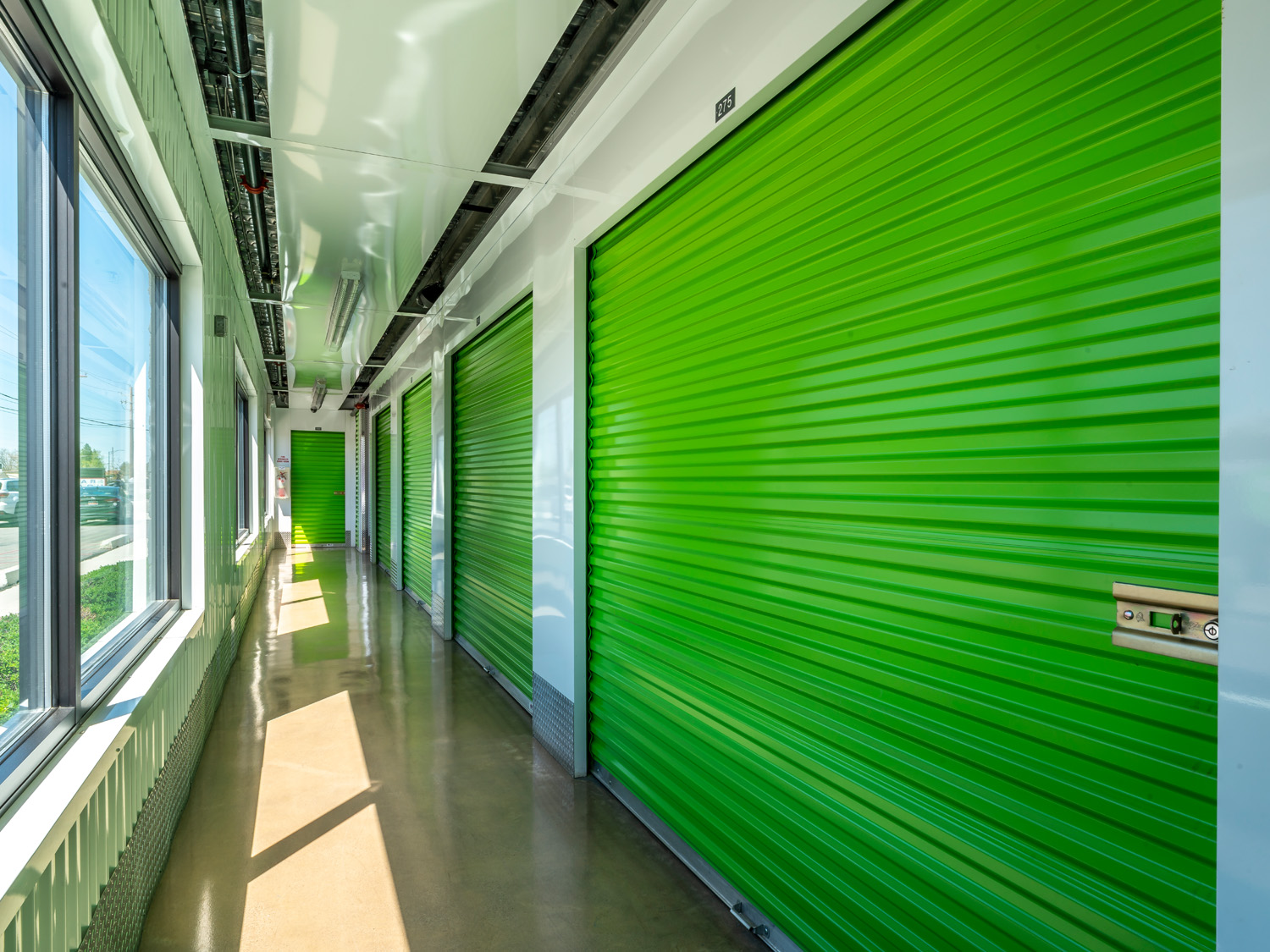Wondering if you need to rent a climate-controlled storage unit? Check out our guide for answers to frequently asked questions about climate-controlled storage—and determine if it’s the best storage option for your needs!
Do You Need Climate-Controlled Storage?
If you find yourself answering yes to the following questions, it’s recommended to rent climate-controlled self storage:
- Are you storing your belongings for a long period of time?
- Are you storing any valuable or sentimental items that you want to protect from damage?
- Do you live in an area with extreme temperature swings or high humidity?
- Are you storing items that are sensitive to temperature or humidity, such as furniture, electronics, or artwork?
What Is Climate Control?
Climate control keeps your storage unit within a certain temperature or humidity range. This can help protect sensitive items from damage caused by extreme temperature changes. At Extra Space Storage, climate-controlled storage units are typically kept between 55 and 80 degrees. To help protect your items no matter what type of climate your area experiences, Extra Space Storage offers multiple types of climate control, including heated, air-cooled, and humidity-controlled units.
Why Is Climate-Controlled Storage Necessary?
Climate-controlled storage may be necessary if you’re planning to store items that are sensitive to extreme temperatures or humidity levels. By maintaining a consistent environment, climate control reduces the chances that temperature-sensitive items will be damaged in storage. If you’re deciding whether to rent climate-controlled storage vs not, this amenity is beneficial for anyone who needs to store delicate collectibles and other valuables in a region where weather changes are common.
How hot can a storage unit get?
Storage units that don’t have climate control can reach temperatures 30 degrees higher than the outside temperature in certain regions. Particularly in uncontrolled storage environments like drive-up storage units that don’t have the insulation of an indoor building, stored items can easily be damaged by extreme heat.
Should I be worried about a cold storage unit?
If you live in an area where temperatures drop below freezing, a cold self storage unit may be cause for concern. Cold temperatures can cause furniture, electronics, musical instruments, and other expensive, temperature-sensitive items to shatter, crack, warp, or stop functioning properly. Heated storage can help prevent your items from being damaged by cold temperatures.
Can humidity damage my items in storage?
When kept in an uncontrolled storage environment, humidity can damage items made from materials like metal, paper, fabric, and more. Too much humidity can cause mold and mildew growth that may irreparably damage your belongings. Choosing humidity-controlled storage can help protect items from damage caused by excessive moisture.
What is the Price of Climate-Controlled Storage?
Climate-controlled storage rates vary depending on any additional amenities, the size of your unit, availability, your location, and more. Here is a list of popular markets and the cost of climate-controlled storage units.
| City, State | Minimum | Maximum |
| Atlanta, GA | $20 | $302 |
| Brooklyn, NY | $7 | $505 |
| Chicago, IL | $14 | $359 |
| Dallas, TX | $21 | $340 |
| Houston, TX | $18 | $270 |
| Las Vegas, NV | $23 | $201 |
| Miami, FL | $15 | $421 |
| Orlando, FL | $18 | $279 |
| Phoenix, AZ | $11 | $247 |
| San Antonio, TX | $17 | $240 |
**Prices are subject to change and may not reflect current availability or promotions.
What Items Need Climate-Controlled Storage?
While the need for climate control depends on where you live and whether you need short or long-term storage, the following items are more sensitive to extreme temperature changes and would benefit from storage units with climate control:
- Antiques
- Appliances
- Artwork
- Books
- China
- Clothing
- Collectibles
- Documents
- Electronics
- Furniture
- Mattresses
- Musical Instruments
- Photos
- Wine
Do important documents need climate-controlled storage?
If you’re going to store paper files and photos, you should rent a unit at a climate-controlled storage facility. Paper is susceptible to mold and mildew growth, and it can fade or warp over time. Securing a climate-controlled storage rental can help protect paper documents and save you from the hassle of needing to replace them.
Should clothes be stored in climate control?
Storing clothes in climate-controlled storage is the best way to keep them in top shape. When kept in uncontrolled conditions, clothing fabrics can stretch, fade, develop mold and mildew, and even deteriorate. You should also keep clothes in storage in air-tight bags or plastic tubs to help keep them usable for years to come.
Do you need climate-controlled storage for furniture?
It’s recommended that you rent temperature-controlled storage units for furniture. Storing furniture without climate control can allow unprotected wooden and upholstered furniture, leather chairs and couches, and even furniture made from metal and plastic to be damaged by seasonal changes.
Do I need climate control for TVs & other electronics?
TVs and other electronics need climate control because extreme heat and cold can severely damage electrical components. Even if you live in a mild climate, renting indoor, climate-controlled storage units that provide temperature-regulated environments is the safest way to store your electronics.
What appliances need to be stored in climate-controlled units?
Small and large appliances alike can benefit from climate control. Electrical components in appliances can stop working after sitting too long in extreme heat or cold, and appliances with water hookups like washing machines and dishwashers can break in freezing temperatures or develop mold in humid environments. You should also cover your electronics with some sort of covering to prevent surface scratches and help keep dust from accumulating.
Do I need a climate-controlled storage unit for wine?
If you plan on storing wine, renting climate-controlled wine storage is a must. Wine corks can dry out and bottles can freeze in cold temperatures, while hot and humid conditions can cause heat-damaged wine—which both affect the taste and overall quality of the wine.
Is there climate-controlled commercial storage?
Yes, there are climate-controlled commercial storage units available at Extra Space Storage. Businesses seeking self storage should consider renting a unit at a climate-controlled storage facility to help keep documents, inventory, materials, or equipment safe and in good condition.
Should I have climate control for indoor vehicle storage?
You don’t always need climate-controlled vehicle storage, as most vehicles are designed to withstand extreme temperature changes. That said, if you plan to store a classic car or motorcycle that needs more protection from the elements, climate-controlled car storage can help prevent rust and other body damage.
Are there climate-controlled storage lockers?
Storage lockers sometimes include climate control, but it’s not a common feature. Most storage lockers are located in an indoor building, so they do have some insulation from external temperatures already.
Where Do I Need Climate-Controlled Storage?
Typically, you should rent climate-controlled storage if you live in an area that experiences high humidity or temperatures that drop below 32 degrees or go above 90 degrees—especially if you need long-term storage. Consider renting temperature-controlled self storage if you live in one of the following regions of the U.S.:
- The South
- The West
- The Midwest
- The East coast
Is climate-controlled storage necessary in the South?
Climate control is important when renting self storage in the South because the region experiences extreme heat and high humidity. This region includes Alabama, Arkansas, Florida, Georgia, Kentucky, Louisiana, Maryland, Mississippi, North Carolina, South Carolina, Tennessee, Texas, Virginia, and West Virginia.
Why do you need climate-controlled storage in the West?
Depending on where you live in the West, you may need climate-controlled storage. In certain areas of states like Idaho, Washington, Oregon, and Northern California that have milder weather year-round, the need for temperature-controlled storage may be lower. But in Southern California, Arizona, Nevada, Utah, and New Mexico—where temperatures can exceed 100 degrees for long periods of time—it’s best to rent a unit with climate control. Areas in Colorado, Wyoming, and Montana that receive a lot of snowfall could also benefit from climate control.
Should I get climate-controlled storage in the Midwest?
You should strongly consider renting climate-controlled storage in the Midwest, as this region experiences all four seasons with extreme temperature shifts. This region includes Iowa, Illinois, Indiana, Kansas, Minnesota, Missouri, Nebraska, North Dakota, Ohio, Oklahoma, South Dakota, and Wisconsin.
Why do I need climate-controlled storage on the East Coast?
Climate control is a good idea for those renting self storage on the East Coast. If you’re in New England or Mid-Atlantic states like Delaware, Maryland, Pennsylvania, New York, and New Jersey—then climate-controlled storage is a good solution for protecting items from extreme cold. If you’re in the Southeast, where extreme heat and humidity are common, we recommend renting a storage unit with climate control.
Is Climate-Controlled Storage Worth It?
Though temperature-controlled storage units are generally more expensive than standard ones, it’s worth renting a climate-controlled unit to help protect your delicate items. Climate control makes it less likely that your items will be irreparably damaged by extreme temperature changes, which can save you money and give you peace of mind when keeping valuable belongings in storage. Plus, climate-controlled storage makes moving items in and out of your unit more comfortable for you during all types of weather.
***
Looking for affordable climate-controlled storage near you? Extra Space Storage has storage facilities across the U.S. that offer secure storage for temperature-sensitive items. Check out our climate-controlled storage rates and find units near you!




